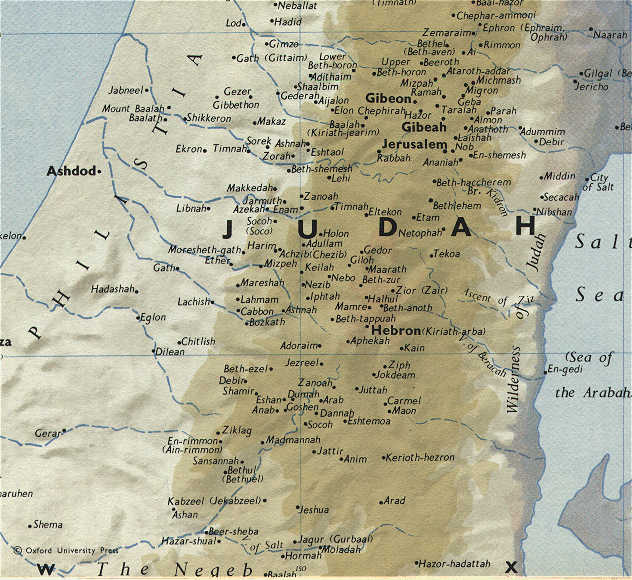|
May
29
|
Reading 1 - Joshua 15
You will need a map for this. Try this one!
Peter Cresswell
Peter Forbes
15:16-19 is found recorded in Judges 1:12-15.
15:29
Baalah is actually Kirjath Jearim (16:60)
Important to be remembered because of the way in which we are introduced
to Baal of Judah (2
Samuel 6:2).
Peter
Forbes
Peter Forbes
Reading 2 - Isaiah 20 & 21
Peter Cresswell
Peter Cresswell
20:4 Ethiopia suffered judgment from God on a number of occasions. At the time of the Assyrian invasion of Israel. [here, 43:3] And the Babylonians [Ezekiel 30:4,9]
21:9
Babylon is fallen, is fallen; - before Babylon has even risen to power.
Such is the wonder of the way in which our father works. This prophecy
is echoed [Jeremiah
51:8 Revelation 14:8 18:2]. That Isaiah’s words were fulfilled
in the coming of the Medo Persian kings gives us confidence that the words
of Revelation will also be fulfilled in due course.
Peter
Forbes
Enacted parables (20:2) are a feature of some of the prophets. The prophet will do something to demonstrate, over a period of time, what God intends to do. Ezekiel is a classic example of such enacted parables. Consider how you would react if you saw a man behaving as Isaiah was doing at this time. Surely his actions must have had some impact on those who saw him.
ch
21 - Remember that this vision of Judah being freed from captivity
in Babylon was written before Israel were taken captive by the Assyrian.
Peter
Forbes
ch 20 - One presumes that Isaiah actually performed this enacted parable in Egypt? Or was it for the benefit of Israel who were to invaded by the Assyrians. If Israel saw it Hezekiah may well have taken the fulfilment of these things as the assurance that God would deliver him.
21:13
The burden upon Arabia is matched by a later burden from Jeremiah (49:28)
Peter
Forbes
Sometimes the things we think are the most stable things in our lives are suddenly taken away from us and we find our lives falling to pieces around us. We can often find that we place too much emphasis on possessions, money, jobs, family, relationships or enjoying life that we end up making one or more of them the foundation of our life. If those sort of things become our foundation our whole world can fall down when they fail. There were people in Isaiah 20 who trusted in Cush and Egypt and in their military strength to deliver them from the might of Assyria. But the strength of Egypt and Cush were to fail and those who boasted in their strength were to be afraid and put to shame. There is only one thing that is really strong enough and secure enough for us to place our faith and strength in. That strength is in the LORD our God. He will never change. He will always be strong. He will always be there for us and he will never let us down. So even if the world moves and shifts around us as shifting sands, we can rely on the rock that we have built on - God our stronghold.
Robert Prins
Reading 3 - Philemon
Peter Cresswell
Peter Forbes
1:2 Mention of 'the church in thy house' provides an indication as to where ecclesias met in the first century. We should not let our experience of modern day meetings cloud our appreciation of the way that brethren and sisters opened their houses in the first century. Consider
| Acts 2:46 | Breaking bread from house to house |
| Romans 16:5 | The church in their house |
| 1 Corinthians 16:19 | The church in their house |
| Col 4:15 | The church in their house |
Peter Forbes
One thing I have learned through teaching the word of God to various people is that the person who has benefited most and come to the fullest understanding from what I have taught, has been myself. It never ceases to amaze me how that teaching something to someone else reinforces what you already know. So Paul's advice to Philemon is absolutely brilliant! He says, "I pray that you may be active in sharing your faith, so that you will have a full understanding of every good thing we have in Christ."
So we learn that there are, not two, but three really good reasons to share our faith. We need to share our faith to spread the gospel message so that others can be saved. We need to do it to obey the commandment that Christ gave. And we should share our faith so that we can consolidate and strengthen our own faith as we obey Christ's commandment and spread the gospel.
Of course, Paul's advice was not just for Philemon, it is for us as well. So let us not just share our faith, but be active in sharing our faith. Let's do it more and more. Paul prayed it for you too, "I pray that you may be active in sharing your faith, so that you will have a full understanding of every good thing we have in Christ."
Robert Prins
